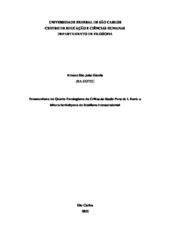| dc.contributor.author | Garcia, Ernane São João | |
| dc.date.accessioned | 2022-06-13T12:59:49Z | |
| dc.date.available | 2022-06-13T12:59:49Z | |
| dc.date.issued | 2022-06-07 | |
| dc.identifier.citation | GARCIA, Ernane São João. Fenomenismo no Quarto Paralogismo da Crítica da Razão Pura de I. Kant: a leitura berkeleyana do idealismo transcendental. 2022. Trabalho de Conclusão de Curso (Graduação em Filosofia) – Universidade Federal de São Carlos, São Carlos, 2022. Disponível em: https://repositorio.ufscar.br/handle/ufscar/16276. | * |
| dc.identifier.uri | https://repositorio.ufscar.br/handle/ufscar/16276 | |
| dc.description.abstract | The philosophies of Kant and Berkeley aim to refute skepticism and, for this purpose,
they defend the thesis according to which the objects of our knowledge are,
respectively, “representations” or “ideas”. In general, this thesis is classified in the
literature as “phenomenism”. Such similarity between the position of both philosophers
has led many critics to see the position of Immanuel Kant in the Fourth Paralogism of
the first edition of the Critique of Pure Reason (1781), a passage in which the
philosopher intends to refute the “empirical idealism”, as being identical to that of the
philosopher George Berkeley in the Principles (1710) and the Dialogues (1713). This
reading, defended, among others, by Norman Kemp Smith, Colin M. Turbayne and
James Van Cleve, conflicts with two assertions by Kant: that his transcendental idealism
is “the opposite” of Berkeley's and that the Fourth Paralogism differs from the
Refutation of Idealism of the second edition of the first Critique only in the way of
proving. Against this Berkeleyan reading of the Fourth Paralogism, we argue that Kant's
position in this passage is fundamentally different from Berkeley's. To prove our thesis,
we try to determine the nature of Berkeleyan phenomenism, which was determined as
an ontological phenomenism, and then to verify if Kantian phenomenism is identical to
that. This was possible by the application of the distinction, presented by Kant in the
Fourth Paralogism, according to which objects can be considered in two senses, the
empirical and the transcendental, to the Kantian notion of “representation”, which
allowed us to determine whether the Kantian concept of “representation” is or is not
equivalent to the Berkeleyan concept of “idea”. As a result, we show that the Kantian
conception of “representation” is radically new in the light of the philosophical tradition
and that Kant's phenomenalism is an epistemic phenomenalism, being, therefore,
radically different from Berkeley's ontological phenomenalism, which allows us to
resolve the two problems outlined. | eng |
| dc.description.sponsorship | Não recebi financiamento | por |
| dc.language.iso | por | por |
| dc.publisher | Universidade Federal de São Carlos | por |
| dc.rights | Attribution-NonCommercial-NoDerivs 3.0 Brazil | * |
| dc.rights.uri | http://creativecommons.org/licenses/by-nc-nd/3.0/br/ | * |
| dc.subject | Idealismo transcendental | por |
| dc.subject | Idealismo empírico | por |
| dc.subject | Fenomenismo | por |
| dc.subject | Realismo transcendental | por |
| dc.subject | Realismo empírico | por |
| dc.title | Fenomenismo no Quarto Paralogismo da Crítica da Razão Pura de I. Kant: a leitura berkeleyana do idealismo transcendental | por |
| dc.title.alternative | Phenomenalism in the Fourth Paralogism of I. Kant's Critique of Pure Reason: the Berkeleyan reading of transcendental idealism | eng |
| dc.type | TCC | por |
| dc.contributor.advisor1 | Baioni, José Eduardo Marques | |
| dc.contributor.advisor1Lattes | http://lattes.cnpq.br/9613180348313909 | por |
| dc.description.resumo | As filosofias de Kant e Berkeley têm por objetivo refutar o ceticismo e, para tanto, defendem a tese segundo a qual os objetos de nosso conhecimento são, respectivamente, “representações” ou “ideias”. Esta tese, em geral, é classificada na literatura como “fenomenismo”. Tal similaridade entre a posição de ambos os filósofos tem levado muitos críticos a ver a posição de Immanuel Kant no Quarto Paralogismo da primeira edição da Crítica da razão pura (1781), passagem na qual o filósofo tem por objetivo refutar o “idealismo empírico”, como idêntica à do filósofo George Berkeley nos Principles (1710) e nos Dialogues (1713). Esta leitura, defendida, entre outros, por Norman Kemp Smith, Colin M. Turbayne e James Van Cleve, entra em conflito com duas afirmações de Kant: a de que seu idealismo transcendental é “o oposto” do de Berkeley e a de que o Quarto Paralogismo só difere da Refutação do Idealismo da segunda edição da primeira Crítica na maneira de provar. Contra essa leitura berkeleyana do Quarto Paralogismo, defendemos que a posição de Kant nesta passagem é fundamentalmente distinta da de Berkeley. Para provar nossa tese, tratamos de determinar a natureza do fenomenismo berkeleyano, que foi determinado como um fenomenismo ontológico, e então verificar se o fenomenismo kantiano é idêntico àquele. Isso foi possível por meio da aplicação da distinção, apresentada por Kant no Quarto Paralogismo, segundo a qual os objetos podem ser considerados em dois sentidos, o empírico e o transcendental, à noção kantiana de “representação”, o que nos permitiu determinar se o conceito kantiano de “representação” equivale ou não ao conceito berkeleyano de “ideia”. Como resultado, mostramos que a concepção kantiana de “representação” é radicalmente nova em face da tradição filosófica e que o fenomenismo de Kant é um fenomenismo epistêmico, sendo, portanto, radicalmente distinto do fenomenismo ontológico Berkeley, o que permite desfazer os dois problemas apontados. | por |
| dc.publisher.initials | UFSCar | por |
| dc.subject.cnpq | CIENCIAS HUMANAS::FILOSOFIA::EPISTEMOLOGIA | por |
| dc.subject.cnpq | CIENCIAS HUMANAS::FILOSOFIA::HISTORIA DA FILOSOFIA | por |
| dc.publisher.address | Câmpus São Carlos | por |
| dc.contributor.authorlattes | http://lattes.cnpq.br/8150590189872500 | por |
| dc.publisher.course | Filosofia - Fil | por |

